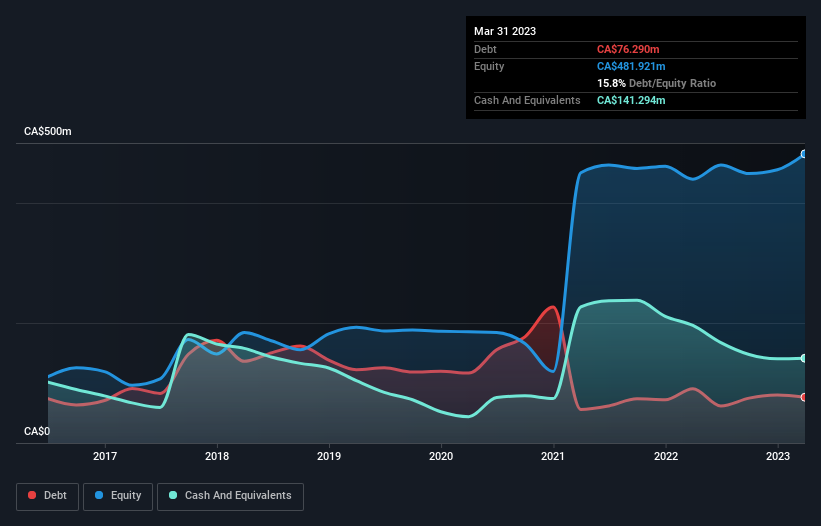
David Iben put it well when he said, 'Volatility is not a risk we care about. What we care about is avoiding the permanent loss of capital.' When we think about how risky a company is, we always like to look at its use of debt, since debt overload can lead to ruin. We note that NexGen Energy Ltd. (TSE:NXE) does have debt on its balance sheet. But the more important question is: how much risk is that debt creating?
When Is Debt A Problem?
Debt assists a business until the business has trouble paying it off, either with new capital or with free cash flow. In the worst case scenario, a company can go bankrupt if it cannot pay its creditors. However, a more frequent (but still costly) occurrence is where a company must issue shares at bargain-basement prices, permanently diluting shareholders, just to shore up its balance sheet. Of course, debt can be an important tool in businesses, particularly capital heavy businesses. When we think about a company's use of debt, we first look at cash and debt together.
View our latest analysis for NexGen Energy
What Is NexGen Energy's Net Debt?
As you can see below, NexGen Energy had CA$76.3m of debt at March 2023, down from CA$90.4m a year prior. However, its balance sheet shows it holds CA$141.3m in cash, so it actually has CA$65.0m net cash.

How Strong Is NexGen Energy's Balance Sheet?
We can see from the most recent balance sheet that NexGen Energy had liabilities of CA$13.0m falling due within a year, and liabilities of CA$79.3m due beyond that. On the other hand, it had cash of CA$141.3m and CA$1.92m worth of receivables due within a year. So it actually has CA$50.9m more liquid assets than total liabilities.
Having regard to NexGen Energy's size, it seems that its liquid assets are well balanced with its total liabilities. So it's very unlikely that the CA$2.55b company is short on cash, but still worth keeping an eye on the balance sheet. Simply put, the fact that NexGen Energy has more cash than debt is arguably a good indication that it can manage its debt safely. The balance sheet is clearly the area to focus on when you are analysing debt. But ultimately the future profitability of the business will decide if NexGen Energy can strengthen its balance sheet over time. So if you want to see what the professionals think, you might find this free report on analyst profit forecasts to be interesting.
Since NexGen Energy doesn't have significant operating revenue, shareholders must hope it'll sell some fossil fuels, before it runs out of money.
So How Risky Is NexGen Energy?
We have no doubt that loss making companies are, in general, riskier than profitable ones. And in the last year NexGen Energy had an earnings before interest and tax (EBIT) loss, truth be told. Indeed, in that time it burnt through CA$100m of cash and made a loss of CA$38m. With only CA$65.0m on the balance sheet, it would appear that its going to need to raise capital again soon. Even though its balance sheet seems sufficiently liquid, debt always makes us a little nervous if a company doesn't produce free cash flow regularly. There's no doubt that we learn most about debt from the balance sheet. However, not all investment risk resides within the balance sheet - far from it. Case in point: We've spotted 3 warning signs for NexGen Energy you should be aware of, and 2 of them are a bit unpleasant.
At the end of the day, it's often better to focus on companies that are free from net debt. You can access our special list of such companies (all with a track record of profit growth). It's free.
Valuation is complex, but we're here to simplify it.
Discover if NexGen Energy might be undervalued or overvalued with our detailed analysis, featuring fair value estimates, potential risks, dividends, insider trades, and its financial condition.
Access Free AnalysisHave feedback on this article? Concerned about the content? Get in touch with us directly. Alternatively, email editorial-team (at) simplywallst.com.
This article by Simply Wall St is general in nature. We provide commentary based on historical data and analyst forecasts only using an unbiased methodology and our articles are not intended to be financial advice. It does not constitute a recommendation to buy or sell any stock, and does not take account of your objectives, or your financial situation. We aim to bring you long-term focused analysis driven by fundamental data. Note that our analysis may not factor in the latest price-sensitive company announcements or qualitative material. Simply Wall St has no position in any stocks mentioned.
About TSX:NXE
NexGen Energy
An exploration and development stage company, engages in the acquisition, exploration, evaluation, and development of uranium properties in Canada.
Excellent balance sheet low.
Similar Companies
Market Insights
Community Narratives




